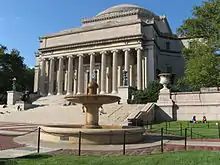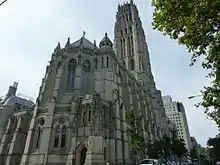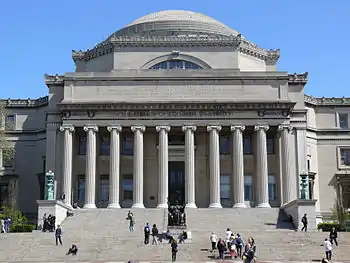Teachers College, Columbia University
Teachers College, Columbia University (TC) is a graduate school of education, health, and psychology in New York City.[2][3] Founded in 1887, it has served as the Faculty and Department of Education of Columbia University since its affiliation in 1898.[4][5] Teachers College is the oldest and largest graduate school of education in the United States.[6]
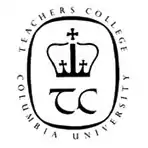 | |
| Type | Private |
|---|---|
| Established | 1887 |
| Endowment | $315.9 million (2018)[1] |
| President | Thomas R. Bailey |
| Provost | Stephanie J. Rowley |
| Students | 5,299 |
| Location | , , United States |
| Campus | Urban |
| Website | tc |
 | |
Teachers College alumni and faculty have held prominent positions in academia, government, music, non-profit, healthcare, and social science research just to name a few. Overall, Teachers College has over 90,000 alumni in more than 30 countries.[7][8] Notable alumni and former faculty include John Dewey, Art Garfunkel, Dr. Ruth Westheimer, Carl Rogers, Margaret Mead, Bill Campbell, Georgia O'Keeffe, Edward Thorndike, Rollo May, Donna Shalala, William Schuman (former president of the Juilliard School), Lee Huan (Premier of the Republic of China), Shirley Chisholm (first black woman elected to the United States Congress), Hamden L. Forkner (founder of Future Business Leaders of America), and E. Gordon Gee (former president of Brown University).
History
Founding and early history
.jpg.webp)
In 1880, the Kitchen Education Association (KEA) was founded by philanthropist Grace Hoadley Dodge, the daughter of wealthy businessman William Dodge. The association's focus was to replace miniature kitchen utensils for other toys that were age-appropriate for kindergarten-aged girls.[9][10] In 1884, the KEA was rebranded to the Industrial Education Association (IEA), in the spirit of widening its mission to boys and parents. Three years later, it moved to the former Union Theological Seminary building on University Place, as well as founded a coeducational private school called the Horace Mann School.[11]
In 1887 William Vanderbilt Jr. offered a substantial financial sum to the IEA.[10] With the support of Dodge, Vanderbilt appointed Nicholas Murray Butler, the future longest-serving president of Columbia University and Nobel Peace Prize recipient, as new president of the IEA.[10][12] The IEA decided to provide schooling for the teachers of the poor children of New York City. Thus, in 1887–1888, it employed six instructors and enrolled thirty-six juniors in its inaugural class as well as eighty-six special students.[10] To reflect the broadening mission of education beyond the original philanthropic intent set forth by Dodge, the IEA changed its name to the New York School for the Training of Teachers,[10][11] and received its temporary charter from the New York State Board of Regents.[11]
By October 1890, the school's trustees were looking for a new campus, as the University Place campus was considered too small. After discussion with Columbia University president Seth Low, the trustees settled on a site in Morningside Heights, near where Columbia's campus was being built.[13] In 1892, the name of the New York School for the Training of Teachers was again changed to Teachers College.[10] The next year, Teachers College and Columbia University were affiliated with each other, and the trustees acquired land for the new College campus in Morningside Heights.[14] The buildings for the campus of the College were designed by William Appleton Potter.[14][15] The first structure in the original complex, Main Hall, was completed in late 1894; the last, Milbank Memorial Hall, was finished three years later.[16]
The curriculum combined a humanitarian concern to help others with a scientific approach to human development. The College was affiliated with Columbia University in 1898 as the University's Graduate School of Education.[4][14] A new building for Horace Mann was erected in 1899,[17] followed by the Frederick Ferris Thompson Memorial Hall in 1902–1904.[18] Additionally, a four-wing dormitory building, called Whittier Hall, was built in 1900–1901.[19] Enrollment increased quickly: the graduating class of 1911 contained 686 students, as opposed to the 26 students in the first graduating class.[20]
Expansion of scope
The founders early recognized that professional teachers need reliable knowledge about the conditions under which children learn most effectively. As a result, the college's program from the start included such fundamental subjects as educational psychology and educational sociology. The founders also insisted that education must be combined with clear ideas about ethics and the nature of a good society; consequently, programs were developed in the history of education and in comparative education.
As the number of school children increased during the twentieth century, the problems of managing the schools became ever more complex. The college took on the challenge and instituted programs of study in areas of administration, economics, and politics. Other programs developed in such emerging fields as clinical and counseling psychology, organizational psychology, developmental psychology, cognitive psychology, curriculum development, instructional technology, media studies and school health care.
Teachers College was also associated with philosopher and public intellectual John Dewey, who served as president of the American Psychological Association and the American Philosophical Association, and was a professor at the facility from 1904 until his retirement in 1930.[21]
Role
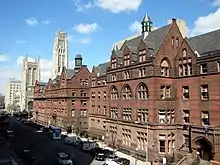
The school offers Master of Arts (M.A.), Master of Education (Ed.M.), Master of Science (M.S.), Doctor of Education (Ed.D.), and Doctor of Philosophy (PhD) degrees in over sixty programs of study. Despite the college's name, less than one-third of students are preparing to become teachers. Graduates pursue careers, for example, in the social sciences, health and health promotion, educational policy, technology, international and comparative education, as well as educational leadership.
According to former president Susan Fuhrman,[22] Teachers College, Columbia University provides solutions to the difficult problems of urban education, reaffirming its original mission in providing a new kind of education for those left most in need by society or circumstance. The college continues its collaborative research with urban and suburban school systems that strengthen teaching in such fundamental areas as reading, writing, science, mathematics, and the arts; prepares leaders to develop and administer psychological and health care programs in schools, businesses, hospitals and community agencies; and advances technology for the classroom, developing new teaching software and keeping teachers abreast of new developments.
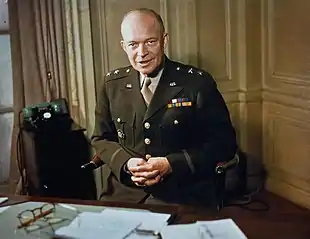
Teachers College also houses a wide range of applied psychology degrees, including one of the nation's leading programs in Organizational Psychology. Every year Captains from the United States Military Academy at West Point are selected for the Eisenhower Leader Development Program (ELDP) and complete the Organizational Psychology M.A. Program to become Tactical Officers (TAC) at West Point.[23][24]
The college also houses the programs in Anthropology. It was foundational in the development of the field of Anthropology and Education. By the 1930s, Teachers College had begun to offer courses in anthropology as part of the foundations of education. By 1948 Margaret Mead started what would be a long association with Teachers College where she taught until the early 1970s. In 1953 Solon Kimball joined the faculty. In 1954 nine professors (including Mead and Solon Kimball) came together to discuss the topic. In the 1960s, these people formed the Council on Anthropology and Education within the American Anthropological Association, and it is still considered as the leading organization in the field.
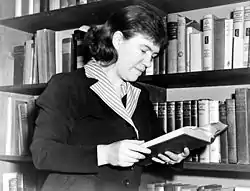
The student experience at Teachers College is governed by a student senate, headed by the Senate President, followed by the Vice-President, Parliamentarian, Communications Officer, and Treasurer. Two Senators, a Master's candidate, & a PhD candidate, are elected each year to represent each academic department at Teachers College to advocate on behalf of current students and Alumni. The TC Senate meets bi-weekly to determine what issues need to be investigated.
Academic departments
- Arts & Humanities
- Biobehavioral Sciences
- Counseling & Clinical Psychology
- Curriculum & Teaching
- Education Policy & Social Analysis
- Health & Behavioral Studies
- Human Development
- International & Transcultural Studies
- Mathematics, Science & Technology
- Organization & Leadership
Rankings
For 2021, U.S. News & World Report ranked Teachers College No. 8 among all graduate schools of education in the United States.[25] In 2008, 2002, 1998, 1997, and 1996, Teachers College was ranked at No. 1 by the publication.
Admissions are highly selective, especially for PhD applicants.
Relationship with Columbia University
Teachers College graduates are awarded Columbia University degrees.[26] Teachers College is statutorily prohibited from conferring its own degrees.[26] Although the College houses PhD programs, these degrees are conferred by the University's Graduate School of Arts and Sciences in a manner analogous to the PhD programs of the University's other professional schools.[27][28]
Teachers College's graduating class participates in the University commencement.[29][30][31] TC graduates are Columbia University alumni, may attend Columbia Alumni Association events, and are eligible for nomination of the alumni medal and membership to the Columbia University Club of New York.[32][33][34][30][31]
Teachers College serves as Columbia University's graduate and professional school of education by virtue of its designation as the University's Faculty and Department of Education.[4] However, the College holds its own corporate status, including an independent administrative structure, board of trustees, and endowment.[35] Graduates receive Columbia University diplomas.
While Teachers College faculty appointments are approved by Teachers College's board of trustees at the discretion of the president of Columbia University, "Columbia University [has] no responsibility for salaries, tenure, or retirement allowances" of officers of Teachers College.[26]
Teachers College shares academic and institutional resources with greater Columbia University including courses of instruction (students may take courses at the Graduate School of Business, the School of International and Public Affairs (SIPA), etc.),[36][37] libraries, health service systems, research centers, classrooms, special event facilities and the Dodge Fitness Center. (The Teachers College Aquatic Center has the oldest indoor pool still in use in all of New York City, as well as one of the oldest in the country).[2]
Columbia student athletes eligible to play their 5th year in the Ivy League can continue their studies at Teachers College and play on Lions' sports teams. Columbia student athletes that graduate in 3 years, as well, can continue playing their last year of eligibility in the Ivy League by continuing at Teachers College.
The Columbia University Senate includes faculty and student representatives from Teachers College who serve two-year terms; all senators are accorded full voting privileges regarding matters impacting the entire University.[38][39] The president of Teachers College is a dean in the University's governance structure.[26]
Housing
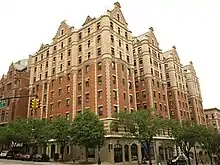
The college has three residence halls for single students. They are 517 West 121st, Grant Hall, and Whittier Hall.[40] The college has three residence halls for family housing. They are Bancroft Hall, Grant Hall, and Sarasota Hall. One bedroom apartments are available for childless students and students who have one child. Two and three-bedroom apartments are available for students who have more than one child.[41]
Lowell Hall and Seth Low Hall have faculty housing units.[42]
Publications
The Teachers College Record has been published by the school continuously since 1900. In 1997 a group of doctoral students from Teachers College established the journal Current Issues in Comparative Education (CICE), a leading open-access online academic journal.[43]
Teachers College Press, founded in 1904, is the national and international book publishing arm of Teachers College and is dedicated to deepening the understanding and improving the practice of education.
Teachers College also publishes The Hechinger Report, a non-profit, non-partisan education news outlet focused on inequality and innovation in education that launched in May 2010.
Presidents
| President | Tenure | |
|---|---|---|
| 1. | Nicholas M. Butler | 1889–1891[44] |
| 2. | Walter L. Hervey | 1893–1897[44] |
| 3. | James Earl Russell | 1898–1926[44] |
| 4. | William Fletcher Russell | 1927–1954[44] |
| 5. | Hollis L. Caswell | 1954–1962[44] |
| 6. | John Henry Fischer | 1962–1974[44] |
| 7. | Lawrence A. Cremin | 1974–1984[44] |
| 8. | Philip M. Timpane | 1984–1994[44] |
| 9. | Arthur E. Levine | 1994–2006[44] |
| 10. | Susan Fuhrman | 2006–2018[45] |
| 11. | Thomas R. Bailey | 2018–present[44] |
Faculty
Current faculty
- Charles Basch, Health Education
- George Bonanno, Clinical Psychology
- Peter T. Coleman, Social-Organizational Psychology and Conflict Resolution
- Christopher Emdin, Science Education
- Edmund W. Gordon, Psychology and Education
- Neil R. Grabois, Mathematics Education
- Joan Dye Gussow, Nutrition Education
- Henry Landau, Mathematics Education
- Suniya Luthar, Psychology and Education
- Elizabeth Midlarsky, Psychology and Education
- Lisa Miller, Clinical Psychology
- Henry O. Pollak, Mathematics Education
- Michael Rebell, Law and Educational Practice
- Yolanda Sealey-Ruiz, English Education
- Robert S. Siegler, Psychology and Education
- Derald Wing Sue, Counseling Psychology
- Barbara Tversky, Psychology and Education
- Erica Walker, Mathematics and Education
- Barbara C. Wallace, Clinical Psychology
- Ruth Westheimer, Adjunct Professor[46]
Past faculty
- Richard Thomas Alexander, founder of New College for the Education of Teachers
- Allen E. Bergin, clinical psychologist
- Elizabeth Burchinal, authority on American folk dance
- Lambros Comitas, Applied Anthropology
- Frank W. Cyr, father of the Yellow School Bus
- Morton Deutsch, social psychologist and founding father of the field of conflict resolution
- John Dewey, philosopher
- Arthur Wesley Dow, arts education
- David F. Duncan, health education
- Elizabeth E. Farrell, first president of the Council for Exceptional Children
- Hamden L. Forkner, founder of Future Business Leaders of America
- Elbert K. Fretwell, second Chief Scout Executive
- Maxine Greene, philosopher of education
- Linda Darling Hammond, founder of the National Center for Restructuring Education
- Virginia Henderson, arguably the most famous nurse of the 20th century
- Leta Stetter Hollingworth, psychology and education
- William Heard Kilpatrick, philosopher of education
- Solon Kimball, anthropologist
- Charles J. Martin, arts instructor
- Margaret Mead, anthropologist
- Jack Mezirow, sociologist; former professor of adult and continuing education[47]
- Harold J. Noah, comparative education
- Nel Noddings, philosopher of education
- Mary Adelaide Nutting, nursing
- Mary Swartz Rose, created nation's first program in nutrition
- Harold Rugg, educational reformer
- Donna Shalala, former United States Secretary of Health and Human Services
- Douglas Sloan, professor of history of education; educational theorist; author
- David Eugene Smith, professor of mathematics & mathematics education
- Graeme Sullivan, art education
- Edward Thorndike, psychologist
- Robert L. Thorndike, psychologist
- Clarence Hudson White, founding member of the Photo-Secession movement
- Mary Schenck Woolman, pioneer in vocational education, one of the first two women on staff
Notable alumni
- Thelma C. Davidson Adair (M.A. 1945; Ed.D. 1959), advocate for human rights; peace; and justice
- Muhammad Fadhel al-Jamali (M.A. 1930; PhD 1934), Prime Minister of Iraq
- Pam Allyn (M.A. 1988), American literacy expert
- Charles Alston (M.F.A. 1931), artist
- Hafizullah Amin (M.A.), President of Afghanistan
- Nahas Gideon Angula (M.A. 1978; Ed.M. 1979), Prime Minister of Namibia
- Mary Antin (1902), immigration rights activist; author of The Promised Land
- Michael Apple (Ed.D. 1970), professor of educational policy studies
- William Ayers (Ed.M.; Ed.D. 1987), founder of Weather Underground; professor of education
- Carolyn Sherwin Bailey (1896), author of Miss Hickory winner of the 1947 Newbery Medal
- Florence E. Bamberger (PhD 1922), American pedagogue; school supervisor; progressive education advocate
- Sarah Bavly (M.S. 1929; PhD 1947), nutrition education pioneer in Israel
- Louis T. Benezet (PhD 1942), former president of Claremont Graduate University
- Sara Benincasa (M.A.), comedian and author
- Randy E. Bennett (M.A. 1977; Ed.M., 1978; Ed.D. 1979), American educational researcher
- C. Louise Boehringer (B.S. 1911), the first female to be elected to office in Arizona
- Zhang Boling (1917), founder and president of National Nankai University
- Louie Croft Boyd (1909), nursing instructor
- Augusta Fox Bronner (B.S. 1906; M.A. 1909; PhD 1914), psychologist and co-director of the first child guidance clinic
- John Seiler Brubacher (M.A.; PhD), educational philosopher; professor at Yale
- Paul G. Bulger (Ed.D. 1951), American academic administrator
- Donald Byrd (PhD 1982), jazz and fusion trumpet player; music educator
- William Vincent Campbell Jr. (Ed.M. 1974), board director for Apple Inc.; CEO for Claris; Intuit Inc. and GO Corporation; chairman of the board of trustees of Columbia University
- Betty Castor (1963), politician and president of the University of South Florida
- P. C. Chang (PhD), philosopher and diplomat
- Arthur W. Chickering (PhD 1958), educational researcher in student development theory
- May Edward Chinn (B.S. 1921), first black woman to graduate from Bellevue Hospital Medical College
- Shirley Chisholm (M.A. 1952), first African American woman elected to Congress and former US Presidential candidate
- Carl Henry Clerk (PGDip. 1926), fourth Synod Clerk of the Presbyterian Church of the Gold Coast
- Peter T. Coleman (PhD), psychologist; executive director of the Morton Deutsch ICCCR and the AC4
- Satis N. Coleman (PhD 1931), music educator
- Ennis Cosby (Ed.M. 1995), special education
- Norman Cousins (B.A.), editor; peace activist
- Arthur Cunningham (M.A. 1957), American composer
- Frank W. Cyr (PhD 1930), American educator and author
- Bidhu Bhusan Das (M.A. 1947), public intellectual; professor; and ranking government official from India
- Sarah Louise Delany (B.A. 1920; Ed.M. 1925), first African-American permitted to teach high school science in New York
- Ella Cara Deloria (B.S. 1915), Yankton Sioux ethnologist
- Patricia DiMango (M.A.), judge; star of CBS’ Hot Bench created by Judge Judy
- Diane DiResta (M.S. 1977), media trainer; speech coach; certified speech pathologist
- Marjorie Housepian Dobkin (M.A.), author; Barnard College professor and dean
- Aaron Douglas (M.A. 1944), American painter; illustrator; visual arts educator; and major figure in the Harlem Renaissance
- Patricia Lynne Duffy (M.A. 1981), synesthesia expert
- Edward C. Elliott (M.A.), educational researcher and president of Purdue University
- Albert Ellis (M.A. 1943; PhD 1947), cognitive behavioral therapist
- Blanche General Ely (M.A. 1923), principal and founder of multiple schools in Broward County, Florida
- Claire Fagin (M.A.), first woman to serve as president of an Ivy League university
- Abraham S. Fischler (Ed.D. 1959), American academic; second president of Nova Southeastern University
- Edward Fitzpatrick (B.S. 1906; M.A. 1907; PhD 1911), president of Mount Mary College
- Rudolf Flesch (PhD 1955), author; inspired Dr. Seuss to write The Cat in the Hat
- William Patrick Foster (Ed.D. 1955), revolutionized college marching band technique
- William Trufant Foster (PhD 1911), economist; first president of Reed College
- Susan Fuhrman (PhD 1977), first female president of TC; former UPenn dean
- Clarence Gaines (M.A. 1950), hall of fame basketball coach of Winston-Salem State University
- Mildred García (Ed.D. 1987), president of the American Association of State Colleges and Universities (AASCU)
- Art Garfunkel (M.A. 1967), singer (Rock and Roll Hall Of Fame inductee); poet; and actor
- Gordon Gee (Ed.D. 1972), president of Ohio State University
- Edmund W. Gordon (Ed.D.), psychologist
- Erick Gordon (Ed.M. 1992), founding director of the Student Press Initiative (SPI)
- Betsy Gotbaum (M.A. 1967), American politician and activist
- Joan Dye Gussow (Ed.D. 1975), professor; author; food policy expert; environmentalist; gardener
- Margaret H'Doubler (1916), dance education
- Martin Haberman (Ed.D. 1962), American academic
- Tsuruko Haraguchi (PhD 1912), psychologist
- Anna Mae Hays (B.S. 1958), first woman in the U.S. Armed Forces to be promoted to a General Officer rank
- Virginia Henderson (B.S. 1932; M.A. 1934), nurse; researcher; theorist; the "first lady of nursing"
- Martha Hill (B.S. 1929), first director of dance at the Juilliard School
- Andy Holt (PhD 1937), president of University of Tennessee
- Lois Holzman (PhD 1977), director and co-founder of the East Side Institute
- Olivia Hooker (M.A. 1947), first African-American woman to serve in the U.S. Coast Guard
- Lee Huan (M.A.), Premier of the Republic of China
- Percy Hughes (M.A.; PhD), philosopher; teacher
- Seymour Itzkoff (PhD 1965), professor emeritus of education and child study at Smith College
- George Ivany (M.A. 1962), president of the University of Saskatchewan
- Kevin Jennings (M.A. 1994), former assistant deputy secretary at the U.S. Department of Education
- David W. Johnson (Ed.D. 1966), social psychologist
- Hazel Johnson-Brown (M.A. 1963), first female African-American general in the United States Army
- Yoshi Kasuya (M.A. 1930, PhD 1933), Japanese educator
- Thomas Kean (M.A. 1963), former governor of New Jersey
- John D. Kendall (M.A.), leader in bringing the Suzuki Method to the US
- Deborah Kenny (PhD 1994), CEO of Harlem Village Academies
- Maude Kerns (M.A. 1906), pioneering abstract artist and teacher[48]
- William Heard Kilpatrick (PhD 1912), philosopher of education; successor of John Dewey
- Imogene King (Ed.D.), pioneer of nursing theory development
- John King Jr. (Ed.M.; Ed.D. 2008), 10th United States Secretary of Education
- Herbert Kliebard (Ed.D. 1963), historian of education
- Ellie Krieger (M.S. 1994), American nutritionist; host of Healthy Appetite with Ellie Krieger on Food Network and Ellie's Real Good Food on PBS
- Eleanor C. Lambertsen (B.S. 1949; M.A. 1950; Ed.D. 1957), revolutionized nursing and health care organization and delivery
- H. S. S. Lawrence (M.A.; Ed.D. 1950), Indian educationist
- Maya Lawrence (M.A. 2010), Olympic fencer
- Harriet Lerner (M.A.), clinical psychologist
- Eda LeShan (B.S. 1944), American writer; television host; counselor; educator; playwright
- Mosei Lin (PhD 1929), Taiwanese academic and educator; first Taiwanese to receive a PhD degree
- Guillermo Linares (Ed.D.), first Dominican elected to public office in the US
- Mort Lindsey (M.A. 1948; Ed.D. 1974), orchestrator; composer; pianist; conductor; musical director
- Ruth Lubic (B.S. 1959; M.A. 1961; Ed.D. 1979), leader of the nurse-midwifery movement in the US
- Agnes Martin (B.A. 1942), artist
- Rollo May (PhD 1949), existential psychologist
- John C. McAdams (M.A.), associate professor of political science at Marquette University
- Jane Ellen McAllister (PhD 1929), first African American woman to earn a PhD in Education in the United States
- Margaret McFarland (PhD 1938), child psychologist, chief consultant to Mister Rogers' Neighborhood
- Morris Meister (PhD 1921), first principal of The Bronx High School of Science, and the first president of The Bronx Community College
- Olga A. Mendez (M.A. 1960), first Puerto Rican woman elected to a US state legislature
- Jiang Menglin (PhD), president of Peking University; Minister of Education for the Republic of China
- Chester Earl Merrow (1937), educator; U.S. Representative from New Hampshire
- Yvonne B. Miller (M.A. 1962), first African-American woman to be elected to the Virginia state house
- Richard P. Mills (Ed.D. 1977), former commissioner of education for Vermont and New York
- Jerome T. Murphy (M.A.), dean emeritus at the Harvard Graduate School of Education
- Georgia O'Keeffe (1914), American artist
- Raphael Montañez Ortiz (Ed.D. 1982), founder of El Museo del Barrio
- Hildegard Peplau (M.A.; PhD), nurse and nurse theorist who led the way towards the humane treatment of patients with behavior and personality disorders
- Regina Peruggi (Ed.D. 1984), American educator
- Esther Peterson (M.A. 1930), American consumer rights activist; 1981 Presidential Medal of Freedom recipient
- Kuo Ping-Wen (M.A. 1912; PhD 1914), Chinese educator
- Anita Pollitzer (1913), suffragette and national chairman of the NWP
- Thomas S. Popkewitz (M.A. 1964), professor of curriculum theory at the University of Wisconsin-Madison
- Neil Postman (M.A. 1955; Ed.D. 1958), cultural critic
- Caroline Pratt (B.A. 1894), progressive educator; founder of City and Country School
- Soon-Yi Previn (Ed.M.), special education
- Thomas Granville Pullen Jr. (Ed.M.; Ed.D. 1926), president University of Baltimore; Maryland State Superintendent of Education
- David Randolph (M.A. 1942), conductor; music educator; radio host
- Robert Bruce Raup (PhD 1926), philosophy of education professor emeritus and critic of the American education system
- Diane Ravitch (PhD 1975), historian of education; former U.S. Assistant Secretary of Education
- Betty Reardon (Ed.D. 1985), founder and director of the Peace Education Center
- Helen Reichert (M.A. 1931), talk show personality; professor
- June Reinisch (M.A. 1970; PhD 1976), American psychologist and director of the Kinsey Institute
- Henrietta Rodman (1904), teacher; feminist activist
- Agnes L. Rogers (PhD 1917), educational psychologist; professor of education
- Carl Rogers (M.A. 1928; PhD 1931), psychologist
- Martha E. Rogers (M.A. 1945), nursing theorist; creator of the Science of Unitary Human Beings
- Marvin Rosen (Ed.M.; Ed.D.), pianist; educator; musicologist; Classical Discoveries radio host
- Miriam Roth (Ed.M.), Israeli writer and scholar of children's books; educator
- Adolph Rupp (M.A.), hall of fame basketball coach of the University of Kentucky
- Juanita Jane Saddler (M.A. 1935), dean of women at Fisk University
- Angela Santomero (M.A.), television executive producer and creator
- Morton Schindel (M.A. 1947), American educator and film producer
- William Schuman (B.S. 1935; M.A. 1937), former president of the Juilliard School of Music and the Lincoln Center for the Performing Arts
- Daniel L. Schwartz (M.A. 1988; PhD 1992), dean of Stanford University's Graduate School of Education
- Jill Sheffield (M.A. 1963), women's reproductive rights advocate
- Robert Sherman (M.A. 1953), American radio broadcaster; author; educator
- Tian-Ming Sheu (Ed.D. 1993), president of the National Academy for Educational Research in Taiwan
- Frank Shifreen (2001), artist; curator; teacher
- Hu Shih (PhD 1917), Chinese philosopher; essayist; and diplomat
- Irma Salas Silva (PhD 1930), Chilean educator
- Rawley Silver (Ed.D. 1936), art therapist
- Ian K. Smith (M.A. 1993), physician and author; appears on VH1's Celebrity Fit Club series; The View; NBC News; and HealthWatch with Dr. Ian Smith
- James Monroe Smith (M.A. 1925; PhD 1927), president of Louisiana State University
- Lucy Diggs Slowe (M.A. 1915), first black woman to serve as Dean of Women at an American University; one of the original founders and first president of Alpha Kappa Alpha
- Karl Struss (B.A. 1912), photographer and cinematographer; pioneer in 3D films
- Elaine Sturtevant (M.A.), American artist
- Leon Sullivan (M.A. 1947), civil rights leader and social activist; 1991 Presidential Medal of Freedom recipient
- Ruth C. Sullivan (M.A. 1953), autism activist
- Bobby Susser (M.A. 1987), children's songwriter; record producer; performer
- Hilda Taba (PhD 1932), architect; curriculum theorist; curriculum reformer and teacher educator
- Alma Thomas (M.A. 1934), expressionist painter and art educator
- Edward Thorndike (PhD 1898), psychologist
- Robert L. Thorndike (M.A. 1932; PhD 1935), psychologist
- Merryl Tisch (Ed.D.), chancellor of the New York State Board of Regents
- Samuel Totten (Ed.D. 1985), genocide scholar
- Minnie Vautrin (M.A. 1919), educator and missionary
- Lynd Ward (1926), artist and storyteller
- Ruth Westheimer (Ed.D. 1970), sex therapist
- Floyd Wilcox (M.A. 1920), third president of Shimer College
- John Davis Williams (Ed.D. 1940), chancellor of the University of Mississippi
- Carmen Rita Wong (M.A. 2000), personal finance expert; former host of On the Money on CNBC
- Deborah Wolfe (M.S. 1938; Ed.D. 1945), Education Chief of the US House of Representatives Committee on Education and Labor
- Marion Thompson Wright (PhD 1940), first African-American woman in the United States to earn PhD in History[49]
- Tao Xingzhi (1917), Chinese educator and political activist
- Darlene Yee-Melichar (M.S. 1984; Ed.D. 1985), American gerontologist
- Anzia Yezierska (1905), novelist
See also
- Coalition of Latino and Latina Scholars
References
- As of June 30, 2018. "U.S. and Canadian Institutions Listed by Fiscal Year (FY) 2018 Endowment Market Value and Change in Endowment Market Value from FY 2017 to FY 2018" (PDF). National Association of College and University Business Officers and Commonfund Institute. 2018. Retrieved July 20, 2019.
- "What is the relationship between Teachers College and Columbia University? on Vimeo". Vimeo.com. January 1, 2013. Retrieved March 18, 2017.
- "Organization and Governance of the University". Columbia.edu. Retrieved March 18, 2017.
- "Organization and Governance of the University". www.columbia.edu.
- "History – Columbia University in the City of New York". www.columbia.edu.
- "2018 Best Education Schools". Grad-schools.usnews.rankingsandreviews.com. Retrieved March 18, 2017.
- "TC Office of Alumni Relations | Teachers College Columbia University". Tc.columbia.edu. Retrieved March 18, 2017.
- "International Alumni Network | Teachers College Columbia University". Tc.columbia.edu. Retrieved March 18, 2017.
- Dolkart 1998, p. 224.
- McCaughey, Robert (October 22, 2003). Stand, Columbia: A History of Columbia University. Columbia University Press. ISBN 9780231503556 – via Google Books.
- Dolkart 1998, p. 225.
- Dolkart 1998, p. 226.
- Dolkart 1998, p. 227.
- Dolkart 1998, p. 228.
- Marter, J.M. (2011). The Grove Encyclopedia of American Art. Oxford University Press. p. 3–PA171. ISBN 978-0-19-533579-8. Retrieved December 23, 2019.
- Dolkart 1998, pp. 231–232.
- Dolkart 1998, pp. 233–234.
- Dolkart 1998, pp. 235–236.
- Dolkart 1998, pp. 237–238.
- Dolkart 1998, p. 241.
- The New York Times edition of January 19, 1953, page 27
- President Fuhrman Outlines the State of the College | TC Media Center. Tc.columbia.edu (November 6, 2009). Retrieved on September 7, 2013.
- "ELDP". O & D. Teachers College, Columbia University. Retrieved June 27, 2020.
- "About Us". Resilience Center for Veterans and Families. Teachers College, Columbia University. Retrieved April 23, 2019.
- "Best Education Schools". Grad-schools.usnews.rankingsandreviews.com. Retrieved March 18, 2017.
- "Charters and Statutes" (PDF). secretary.columbia.edu/files. 2017.
- "Education".
- "Business". gsas.columbia.edu.
- "Degree Requirements – Teachers College Columbia University". Teachers College – Columbia University.
- "Thomas Howard Kean". c250.columbia.edu.
- "Georgia O'Keeffe". c250.columbia.edu.
- "Archived copy" (PDF). Archived from the original (PDF) on December 21, 2016. Retrieved September 8, 2017.CS1 maint: archived copy as title (link)
- "Alumni Medal | Columbia Alumni Association". Alumni.columbia.edu. October 1, 2016. Retrieved September 27, 2018.
- "Alumni Community | Columbia Alumni Association". Alumni.columbia.edu. October 1, 2016. Retrieved September 27, 2018.
- "Teachers College – Columbia University". Teachers College – Columbia University.
- "Teachers College – Columbia University". Teachers College – Columbia University.
- "Columbia University Charters and Statutes" (PDF). Page 97 S244 Courses of instruction.
- "Elections packet" (PDF). senate.columbia.edu. 2017.
- "Elections". senate.columbia.edu.
- "Housing Options Single Housing Archived January 30, 2012, at the Wayback Machine." Teachers College, Columbia University. Retrieved on April 23, 2012.
- "Housing Options Family Housing Archived January 30, 2012, at the Wayback Machine." Teachers College, Columbia University. Retrieved on April 23, 2012.
- "Housing Options Faculty Housing Archived January 30, 2012, at the Wayback Machine." Teachers College, Columbia University. Retrieved on April 23, 2012.
- "Welcome". CICE. Retrieved December 20, 2013.
- "Making History | Teachers College Columbia University". Tc.columbia.edu. Retrieved March 18, 2017.
- "Teachers College Data | Teachers College Columbia University". Tc.columbia.edu. Retrieved March 18, 2017.
- "Dr. Ruth Westheimer Sex Therapist, Author and Media Personality". Teachers College, Columbia University. Columbia University. Retrieved June 4, 2015.
- "Jack Mezirow, Who Transformed the Field of Adult Learning, Dies at 91". TC Media Center. Teachers College, Columbia University. October 11, 2014. Retrieved July 9, 2015.
- Trenton, Patricia; D'Emilio, Sandra (1995). Independent Spirits: Women Painters of the American West, 1890–1945. University of California Press. pp. 126–130. ISBN 978-0520202030.
- Encyclopedia of New Jersey. Lurie, Maxine N., 1940–, Mappen, Marc. New Brunswick, N.J.: Rutgers University Press. 2004. ISBN 0813533252. OCLC 57590112.CS1 maint: others (link)
- Dolkart, Andrew S. (1998). Morningside Heights: A History of its Architecture and Development. Columbia University Press. ISBN 978-0-231-07850-4. OCLC 37843816.CS1 maint: ref=harv (link)
External links
| Wikimedia Commons has media related to Teachers College, Columbia University. |
_(14781510111).jpg.webp)
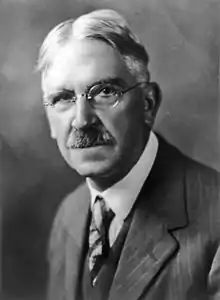
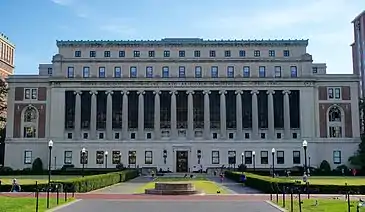
.jpeg.webp)
